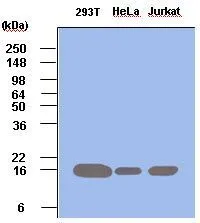
WB analysis of 293T, HeLa and Jurkat lysates (50ug per lane) using Pin1 antibody at a dilution of 1:500.
PIN1 antibody [3G8]
GTX53762
ApplicationsWestern Blot, ELISA
Product group Antibodies
ReactivityHuman
TargetPIN1
Overview
- SupplierGeneTex
- Product NamePIN1 antibody [3G8]
- Delivery Days Customer9
- Application Supplier NoteThe antibody has been tested by ELISA and Western blot analysis to assure specificity and reactivity. Since application varies, however, each investigation should be titrated by the reagent to obtain optimal results. Recommended dilution range for Western blot analysis is 1:500 ~ 1,000. Recommended starting dilution is 1:500.
- ApplicationsWestern Blot, ELISA
- CertificationResearch Use Only
- ClonalityMonoclonal
- Clone ID3G8
- Concentration1 mg/ml
- ConjugateUnconjugated
- Gene ID5300
- Target namePIN1
- Target descriptionpeptidylprolyl cis/trans isomerase, NIMA-interacting 1
- Target synonymsDOD, UBL5, peptidyl-prolyl cis-trans isomerase NIMA-interacting 1, PPIase Pin1, parvulin PIN1, protein (peptidyl-prolyl cis/trans isomerase) NIMA-interacting 1, protein interacting with never in mitosis A1, rotamase Pin1
- HostMouse
- IsotypeIgG1
- Protein IDQ13526
- Protein NamePeptidyl-prolyl cis-trans isomerase NIMA-interacting 1
- Scientific DescriptionPeptidyl-prolyl cis/trans isomerases (PPIases) catalyze the cis/trans isomerization of peptidyl-prolyl peptide bonds. This gene encodes one of the PPIases, which specifically binds to phosphorylated ser/thr-pro motifs to catalytically regulate the post-phosphorylation conformation of its substrates. The conformational regulation catalyzed by this PPIase has a profound impact on key proteins involved in the regulation of cell growth, genotoxic and other stress responses, the immune response, induction and maintenance of pluripotency, germ cell development, neuronal differentiation, and survival. This enzyme also plays a key role in the pathogenesis of Alzheimers disease and many cancers. Multiple alternatively spliced transcript variants have been found for this gene.[provided by RefSeq, Jun 2011]
- ReactivityHuman
- Storage Instruction-20°C or -80°C,2°C to 8°C
- UNSPSC12352203





![Various whole cell extracts (30 μg) were separated by 15% SDS-PAGE, and the membrane was blotted with PIN1 antibody [HL2480] (GTX638829) diluted at 1:1000. The HRP-conjugated anti-rabbit IgG antibody (GTX213110-01) was used to detect the primary antibody.](https://www.genetex.com/upload/website/prouct_img/normal/GTX638829/GTX638829_T-45096_20230707_WB_M_R_23071300_587.webp)

